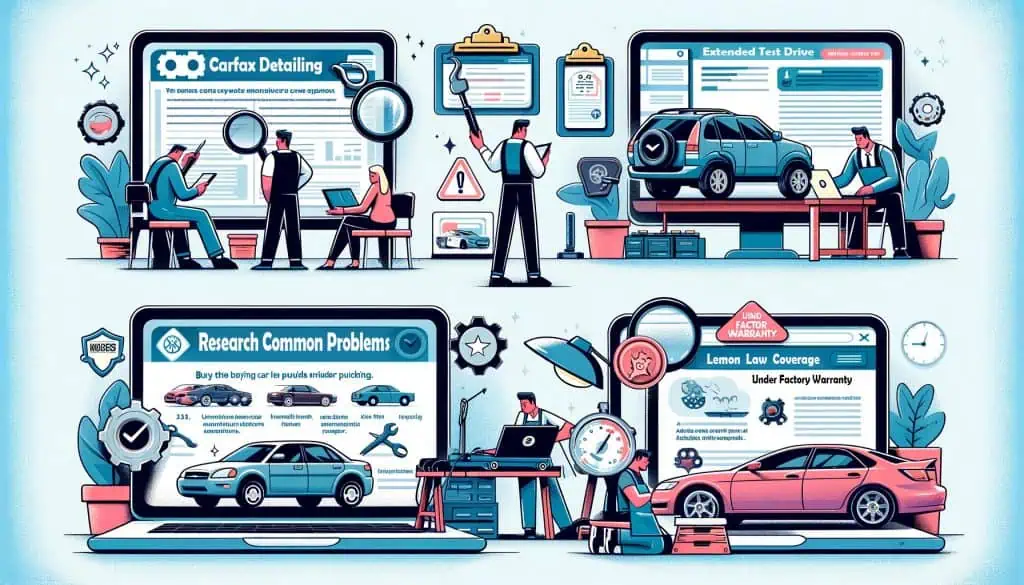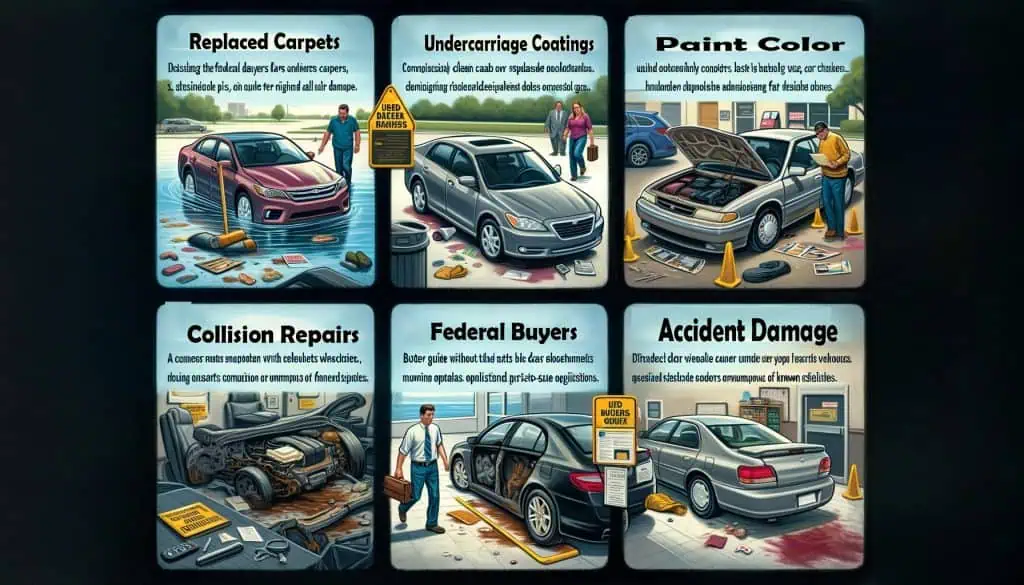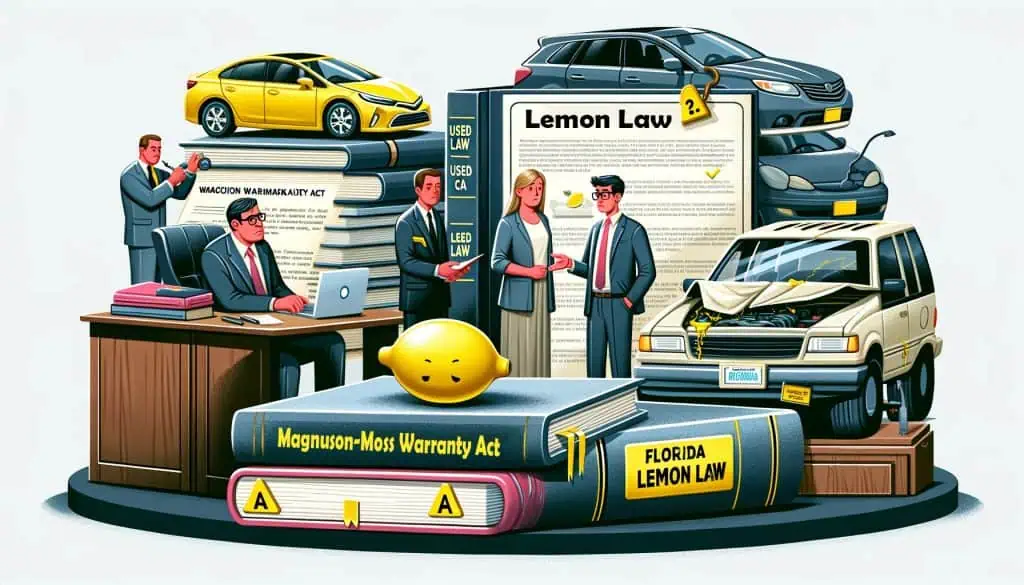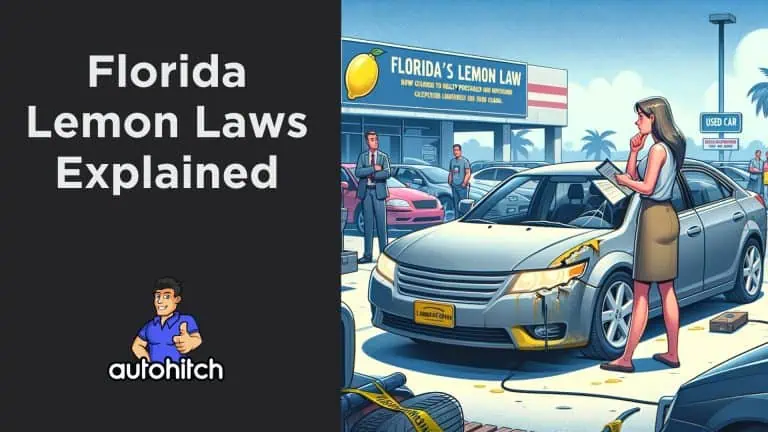If you recently purchased a used car in Florida that turned out to be defective, you may be wondering if the state’s lemon law protects used car buyers and if you can legally return the car back to the dealership.
As a former Florida car dealer, I’m often asked this question, and the short answer is no – Florida’s lemon law only does not cover used cars. However, used car buyers still have options.
Key Takeaways:
- Florida’s lemon law only covers new cars purchased or leased from dealerships.
- Used cars may be protected under the federal Magnuson-Moss Warranty Act if still under warranty.
- Used car buyers must carefully research vehicles and purchase extended warranties when available.
- Dealers must disclose any known defects and provide a Buyers Guide for used vehicles.
- Private sales of used lemons may qualify for consumer fraud claims in court.
While Florida’s lemon law specifically excludes used vehicles, used car buyers can take steps to protect themselves when car shopping.
And if you end up with a defective used lemon, legal options exist depending on where and how you made the purchase.
Relevant Articles To Read:
- What To Look For When Buying A Used Car
- How Many Miles Should A Used Car Have
- Reason to Sue a Car Dealership
- Is It Illegal To Sell A Car Without Disclosing Problems
- What Is A Lemon Law Car
- Carfax Vs. AutoCheck
Table of Contents
Research Vehicles Thoroughly Before Buying Used
I’ve seen customers burned by purchasing used vehicles with undisclosed defects one too many times in my dealership days. It taught me the importance of thorough research before buying used.

Here are some used car buying tips:
- Get a vehicle history report like Carfax detailing any reported accidents or damage. Unfortunately, not all vehicle history is reported so it isn’t foolproof.
- Take an extended test drive and have a mechanic you trust do an inspection. They can catch issues the dealer missed or purposefully omitted.
- Research common problems with the vehicle’s make, model, and year online. Consumer sites detail recurring issues owners report. Watch for trends.
- Only buy used cars still under the factory warranty when possible. This provides some protection. Lemon law coverage ends once factory warranties expire.
Follow these guidelines, and you’ll avoid the heartache and financial pit of buying a used lemon. But if you still end up with one, here are your consumer protection options.
Florida Consumer Guide To The Florida Lemon Law.
Used Car Lemon Law Options
Since Florida’s lemon law only covers new cars and trucks in the first 24 months, we must look to other laws for used vehicle problems. Here’s the scoop:
Magnuson-Moss Federal Warranty Act
The federal Magnuson-Moss Warranty Act protects all consumers with warrantied products, including used cars if still under warranty. Lemon law coverage ends once factory warranties expire.
To qualify for protection, used car buyers should:
- Purchase extended dealer or third-party warranties when available.
- Report defects immediately while the vehicle is still under warranty.
If warrantied defects persist after giving the dealer a reasonable number of repair attempts, lemon law remedies like buybacks or cash settlements can be pursued in court under the Magnuson-Moss Act.
And unlike Florida lemon law, Magnuson-Moss has no mileage or age limits.
As long as your car is still under warranty, this act protects used car buyers with lemons in the Sunshine State.
Dealer Fraud and Violations
When dealers sell vehicles while knowingly hiding defects, it constitutes fraud under federal and Florida consumer protection statutes.

Telltale signs of potential dealer fraud include:
- Clean or replaced carpets evidencing flood damage.
- Thick undercarriage coatings hiding rust or accident damage.
- Re-sprays or paint color mismatches signaling prior collision repairs.
Dealers also violate Florida’s Used Car “Buyers Guide” law if they:
- Fail to display Federal Buyers Guide window labels on all used vehicles.
- Neglect to give Buyers Guide to purchasers after sale.
- Omit known defects or vehicle damage history from Buyers Guides.
Under these circumstances, used car buyers have solid legal claims against fraudulent sellers. And if purchases were financed, lending institutions can also be held accountable for failing to verify condition before financing defective vehicles.
The ‘Lemon’ Term and Bad Private Sales
When dealers or private sellers pass off defective used cars while keeping quiet about known defects, consumers call that getting “sold a lemon.”
This leaves buyers unknowingly inheriting repair bills on vehicles they thought were problem-free. Hence, the bitter lemon analogy when duped into buying worthless lemon cars.
While private sellers are generally not bound by used car lemon laws or compelled to disclose defects, civil consumer fraud claims can provide remedies if you can prove intentional deceit or omission of vehicle facts that influenced sale prices.
So if that Craigslist car with the smooth sales pitch turns out to need a $3,000 transmission overhaul almost immediately after purchase, small claims filings are one way to hold deceitful private sellers accountable.
Winning judgments also help warn future buyers.
Consult a Lemon Law Attorney for Options

As this overview shows, protections do exist for Florida used car buyers stuck with lemons, despite the state’s lemon law only covering new vehicles.
The Magnuson-Moss Warranty Act provides the strongest recourse options for still-warrantied used car lemons. Fraud claims only apply when dealers intentionally hide defects, which amounts to fraud.
Final Thoughts And Recommendations
For professional assistance with used car lemon disputes, always consult with qualified consumer attorneys.
Reputable lemon law firms offer free case consultations and have years of experience fighting dealer and manufacturer misconduct.
So do not just accept things if your used vehicle purchase goes sour.
Depending on the circumstances, retention of dedicated lemon law counsel gives wronged used car buyers the best chances at obtaining legal remedies or cash settlements.
Frequently Asked Questions
How do I file a lemon law claim in Florida?
If your new vehicle has defects after multiple repair attempts, you must first send written notice to the manufacturer by registered mail. Then allow a final repair attempt. If still unsatisfied, complete an arbitration request form with the Florida AG’s office along with supporting documents.
Who pays for lemon law attorney Florida?
If you win a lemon law case in court, Florida law requires the manufacturer to pay the legal fees of the consumer. Reputable lemon law firms also work on contingency fees so consumers only pay if they win their case.
What kind of lawyer do I need to sue a car dealership in Florida?
You will need a Florida lemon law attorney or consumer protection lawyer experienced in auto fraud and breach of warranty cases. They can best advise you of your rights and options in disputes with dealerships.



